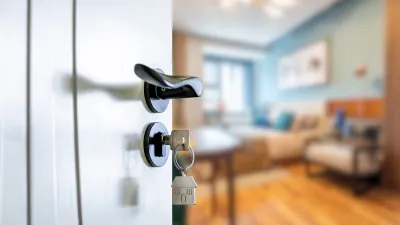As planners, we try to live the urban lifestyle, minimize our carbon footprint, and even grow our own vegetables. I once saw a colleague wearing a button which read “Riding transit is sexy.” Lose the car, bike or walk to work. Hey, if you’re adventurous, you can even take the bus. But this is easier said than done. I’ve lived in New Haven, Boston, Philadelphia, and now Miami. And as every year passes, I find it more and more challenging to cling to my planning ideals.
As planners, we try to live the urban lifestyle, minimize our carbon footprint, and even grow our own vegetables. I once saw a colleague wearing a button which read "Riding transit is sexy." Lose the car, bike or walk to work. Hey, if you're adventurous, you can even take the bus. But this is easier said than done. I've lived in New Haven, Boston, Philadelphia, and now Miami. And as every year passes, I find it more and more challenging to cling to my planning ideals.
After relocating to Miami, I gave up my modest Philadelphia studio for a chic South Beach condo with city views. It was urban living at it's best--a planner's paradise. Years later we would give up the condo and move into a small historic neighborhood in an urban enclave of the City. With restaurants and shopping within walking distance and the promise of a trolley within a half mile of our house I could still enjoy an urban lifestyle, that is until I started to take a closer look at the public school options. And it occurred to me that we cannot build truly sustainable neighborhoods until we bring public education into the folds of our planning culture.
I was reminded of this when examining HUD's proposed Sustainable Communities Grant Program, in advance of the Notice of Funding Availability (NOFA). The Administration's initiative is an unprecedented effort to engage three Federal agencies: HUD, EPA, and DOT-to jointly promote multi-jurisdictional regional planning efforts which merge housing and transportation choices, protect the environment, and address climate change while advancing equitable development. In fact, HUD lists the following six goals in their program description:
1. Provide more transportation choices.
2. Promote equitable, affordable housing.
3. Enhance economic competitiveness.
4. Support existing communities.
5. Coordinate and leverage federal policies and investment.
6. Value communities and neighborhoods.
Sitting at HUD's "Listening Session", a public comment period which was launched in Miami, I drove just twenty blocks west from my house, literally on the other side of the train tracks, to an auditorium in one of the poorest parts of the City to listen to Shelly Poticha talk about one of HUD's most innovative new programs. And as I left the meeting, I realized that this grossly disinvested and neglected neighborhood where, sadly, drive-by shootings are a common occurrence, was part of MY school district. And it occurred to me, how can we ever create sustainable communities if we don't include viable education options? Housing, check. Transportation, check. Carbon emissions reduction, check. Absent-good public education choices.
The truth is that you cannot redevelop effectively if you don't plan for quality education. Everyone wants the best for their children. Here is a missed opportunity. Why didn't HUD join forces with the Education Department (ED) to examine opportunities to link educational improvements to the Sustainable Communities Program? The first thing I learned in school was the importance of evaluating all the existing conditions and connecting them tofind a solution. It took my transportation professor only a brief observation of a classroom in a low performing school to see that the children were struggling to stay awake and focus on the lesson. He soon discovered that many of these children lived along a major truck route which was most active in the middle of the night. The children were unable to sleep at night and, therefore, could not concentrate during the day and learn.
In the Administration's effort to promote economically competitive communities by allocating $150M through Congress' Appropriations Act, they are failing to recognize all the elements which make places sustainable, and are losing a great opportunity to link public education improvements to their Sustainable Communities program.

Trump Administration Could Effectively End Housing Voucher Program
Federal officials are eyeing major cuts to the Section 8 program that helps millions of low-income households pay rent.

Planetizen Federal Action Tracker
A weekly monitor of how Trump’s orders and actions are impacting planners and planning in America.

Ken Jennings Launches Transit Web Series
The Jeopardy champ wants you to ride public transit.

California Invests Additional $5M in Electric School Buses
The state wants to electrify all of its school bus fleets by 2035.

Austin Launches $2M Homelessness Prevention Fund
A new grant program from the city’s Homeless Strategy Office will fund rental assistance and supportive services.

Alabama School Forestry Initiative Brings Trees to Schoolyards
Trees can improve physical and mental health for students and commnity members.
Urban Design for Planners 1: Software Tools
This six-course series explores essential urban design concepts using open source software and equips planners with the tools they need to participate fully in the urban design process.
Planning for Universal Design
Learn the tools for implementing Universal Design in planning regulations.
Ada County Highway District
Clanton & Associates, Inc.
Jessamine County Fiscal Court
Institute for Housing and Urban Development Studies (IHS)
City of Grandview
Harvard GSD Executive Education
Toledo-Lucas County Plan Commissions
Salt Lake City
NYU Wagner Graduate School of Public Service




























